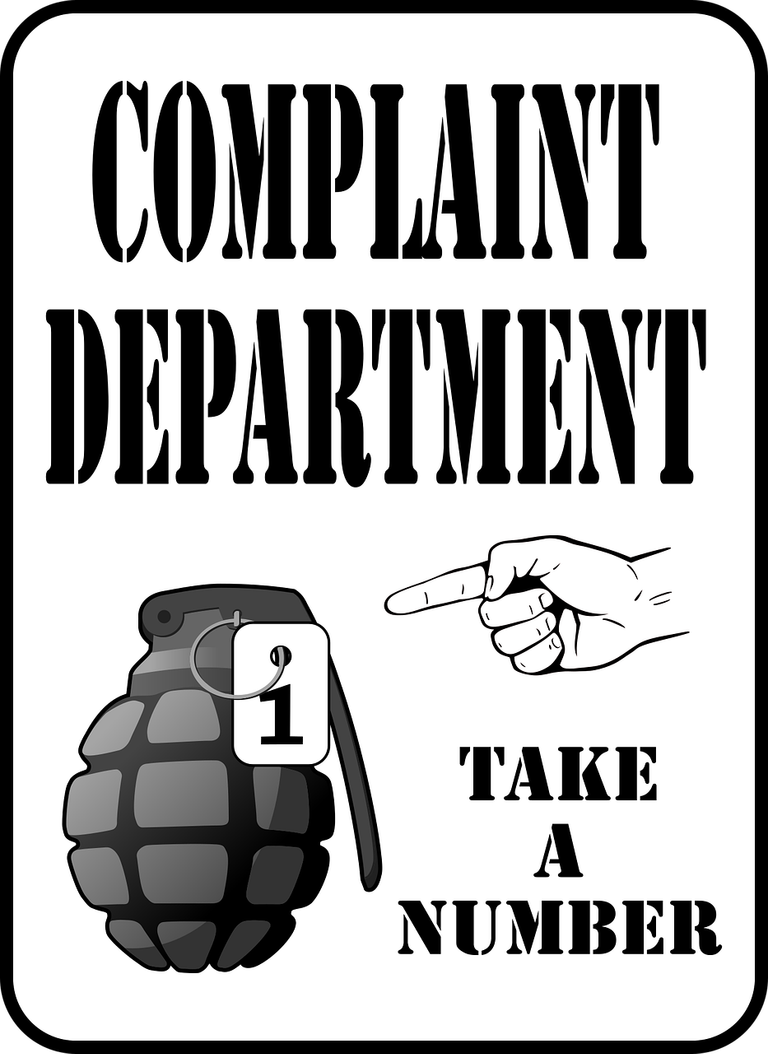Las quejas como intento de atraer empatía (eng-esp)
Hello, friends. Today I'm here to talk to you about something I discussed at university and I think might interest you: Complaints.

Complaints, as I understand them, are the communication of dissatisfaction.
It's a survival mechanism. There's a saying that goes, "A child who doesn't cry, doesn't suckle." Even before we speak, we already complain by crying to survive.
Hence, the complaint must make the person receiving it uncomfortable, so that they try to solve the problem or satisfy the need that the complaint raises.
Which is sometimes complicated because the words of the complaint on the surface don't always convey the real problem that needs to be solved, just as pain doesn't always respond to the same cause.
But there is a dimension of complaint that is often overlooked, and that is empathy.
Complaints, at least those that seem justified to us, tend to generate empathy for the person complaining.
And this empathy is perhaps the most conflicting byproduct of complaining, because it can become an emotional drug, not for the person who feels it, but for the person who notices it in others regarding them.
Upon receiving that empathy, they may mistake it for displays of affection, even admiration. The person who empathizes with you pays attention, wants to listen, is moved by what you are expressing.
You don't have to be a narcissist to make someone feel good about that, in an increasingly information-rich world, where there are so many of us that no one seems to have much importance in the grand scheme of things.
This addiction to empathy can lead to quite toxic behaviors, where we no longer complain to find a solution to a problem, but to gain empathy.
What's more, it's in our best interest for the problem to persist, even worsen, so that it generates even more empathy in others. We end up overreacting, insisting on a way that makes those around us suffer more than we should.
Complaining to gain empathy can affect third parties. If someone dares to seek out an offender—a third party in the form of a partner, a family member, or even an institution—complaining about what the offender does or fails to do can not only generate empathy for the "victim" but also hatred for that third party as a byproduct.
Listening to the complainant, we form very negative judgments about someone we haven't even met, enough to verify that these complaints are real or at least exaggerated.
The people around the person who complains just to gain empathy may not know what's happening to them, but they react instinctively. The complaining begins to tire, not because we are cruel, but because defense mechanisms are activated.
We see the encounter with the person as an emotional pain that we somehow want to avoid. Instead of generating empathy, the person may generate mockery or contempt over time.
This may not make them give up, but rather make them persist in their behavior, reinforcing the effect.
It's a danger to many relationships, even family ones, who must spend a lot of time together. A person addicted to empathy complains until the other person tires of suffering and stops finding enjoyment in their company. They try to solve the problem, or overcome it if there's no solution, to make the pain go away, but they're only accused of being insensitive and impatient.
Because, often, people who complain to gain empathy don't have it with others. If they did, they would understand the emotional suffering they cause by constantly complaining, and they would try to do it less often.
But complaining to gain empathy doesn't only occur in our close relationships; it can even affect the community.
If people become more accustomed to complaining about what's going wrong than talking about what's going well in their lives, they are transmitting emotional pain to others, who then tend to replicate it when treating others in turn. Starting a conversation with a string of complaints negates any positive turn and happiness that this conversation might have, as it would seem like mockery or insolence. After listening to others' misfortunes, talking about the good things that have happened to you, even if it's all true and unrelated, would seem like a joke or insolence.
After sympathy and generosity have worn off, sadness and anger appear, but, beware, also mockery and cynicism. The "soul" of a community that is accustomed to complaining becomes an acidic stone, insensitive and corrosive to the touch.
If they seem to be laughing or cynical about their difficulties, it's not because they are don't care less about problems, but rather because chronic complaining to gain empathy leads them, from time to time, to adopt this attitude as a defense mechanism against bitterness.
If we have found ourselves in this situation of complaining without any prospect of a solution, just because it relieves us or makes us feel good when we share it with others, and this is repeated almost involuntarily, we may be falling into a behavior that, in the long run, clouds our relationships and spirituality.
How can we solve this, in the midst of a community that has perhaps also acquired the habit of complaining instead of trying to be happy?
Something important to remember is that empathy is not generated solely by compassion; it can also be generated by admiration, or by contagion.
Instead of punishing or scorning those who appear peaceful or happy, when the world's news insists on bringing us the most painful misfortunes it can find, we must try to resonate with them.
Not to make those at peace restless, but to be infected by their peace. Don't envy someone you consider has an advantage over you, but rather inspire us and continue striving for our dreams.
Has anyone ever experienced this with a famous artist or scientist whose work and life they admire, and fantasize about trying to feel like them, even though they haven't even tried?
Feeling at peace, or happy, doesn't mean we're insensitive to the world or turning our backs on problems. It's also possible that we're trying to solve them rationally or constructively, and when one has an optimistic or constructive outlook on things, it's possible to arrive at a set of good solutions for everyday problems.
This positive attitude also leads to better social relationships. Although at first a happy person may generate rejection in souls darkened by misfortune, because they consider them a buffoon for not feeling what they feel, over time, that joy can also enlighten them.
You don't have to feel perfectly well to project positivity or joy.
Complaining isn't something we should suppress. It's a survival mechanism, as we know.
When someone decides to complain about something, they should do so because they believe it can help them with the problem in some way, and they should also do so with respect for the empathy of others.
This way, it will never be betrayed; we will always have a helping hand, and we will be taken into account when we talk about something that is happening to us.
Let's build happiness with happiness, since the apparent happiness built on pain and sadness is only a very temporary relief from it.
EN ESPAÑOL
Hola, amigos. Hoy llego a esta casa a conversar con ustedes sobre algo que discutí en la universidad y creo que podría interesarles: La Queja.

La queja, tal como la entiendo, es la comunicación de la insatisfacción.
Se trata de un mecanismo de supervivencia. Existe un refrán que dice “Niño que no llora, no mama”. Incluso antes de las palabras, ya nos quejamos con el llanto para sobrevivir.
De ahí que la queja tenga que incomodar a aquel que la recibe, para que intente resolver el problema o satisfacer la necesidad que esta queja plantea.
Lo cual algunas veces es complicado puesto que las palabras de la queja en la superficie no siempre dan a entender el verdadero problema que debe solucionarse, como no siempre un dolor responde a la misma causa.
Pero existe una dimensión de la queja que suele pasarse por alto, y esa es la de la empatía.
La queja, al menos aquella que nos parece justificada, tiende a generarnos empatía por la persona que protesta.
Y esta empatía viene a ser, tal vez, el subproducto de la queja más conflictivo, porque se puede volver una droga emocional, no para el que la siente, sino para el que la nota en los demás respecto a él.
Al recibir esa empatía, pueden confundirla con manifestaciones de afecto, incluso de admiración. La persona que empatiza contigo te presta atención, quiere escucharte, se emociona con lo que le estás expresando.
No hay que ser un narcisista que para eso lo haga sentir bien a uno, en un mundo cada vez más vasto en información, donde somos tantos que nadie parece tener mucha importancia en el conjunto de las cosas.
Esa adicción a la empatía puede llevar a conductas bastante tóxicas, donde ya no nos quejamos para encontrar la solución a un problema, sino para obtener empatía.
Es más, nos conviene que el problema persista, incluso se agudice, para que genere más empatía todavía en los demás. Llegamos a sobreactuar, a insistir en una forma en que hacemos sufrir a los que nos rodean más de lo que nosotros deberíamos sufrir.
La queja para obtener empatía puede afectar a terceras personas. Si a alguien se le ocurre buscar a un agraviante, un tercero en la forma de una pareja, un familiar, incluso una institución, la queja hacia lo que ese agraviante nos hace o deja de hacer no solo puede generar empatía hacia la “víctima”, sino también odio a esa tercera persona, como subproducto.
Escuchando al que se queja, nos hacemos juicios muy negativos de alguien a quien ni siquiera hemos tratado como para verificar que esas quejas son reales o al menos exageradas.
Las personas que rodean al que se queja solo para obtener empatía puede que no sepan lo que les está pasando, pero reaccionan instintivamente. La queja comienza a cansar, no porque seamos crueles, sino por mecanismos de defensa que se activan.
Vemos el encuentro de la persona como un dolor emocional al que en cierta forma queremos evitar. Puede que, en vez de generar empatía, la persona llegue a generar burla o desprecio con el tiempo.
Eso tal vez no la haga desistir, sino insistir en su comportamiento, retroalimentando el efecto.
Es un peligro para muchas relaciones de pareja, incluso familiares, que deben pasar mucho tiempo juntos. Una persona adicta a la empatía se queja, hasta que el otro se cansa de sufrir y deja de encontrar disfrute en su compañía, intenta solucionar el problema, o superarlo, si no tiene solución, para que el dolor desaparezca, pero solo se le acusa de insensible, de impaciente.
Porque, muchas veces, las personas que se quejan para obtener empatía, no la tienen con los demás. Si la tuvieran, comprenderían el sufrimiento emocional que les causan al protestar continuamente, y tratarían de hacerlo con menos frecuencia.
Pero la queja para obtener empatía no solo se da con nuestras relaciones cercanas, sino que puede hasta afectar a la colectividad.
Si las personas se acostumbran más a quejarse de lo que va mal que hablar de lo que va bien en sus vidas, están transmitiendo un dolor emocional a otras personas, que luego tienden a replicar a la hora de tratar a los demás a su vez.
Empezar una conversación con un rosario de quejas niega cualquier giro a lo positivo y la felicidad que esta conversación pueda tener, pues parecería una burla o una insolencia, después de escuchar las desgracias de los demás, hablar de las cosas buenas que te han pasado, aunque todo sea cierto y poco relacionado.
Después que la simpatía y la generosidad se hayan cansado, aparece la tristeza, el enfado, pero, cuidado, también la burla y el cinismo. El “alma” de una colectividad que acostumbra quejarse se va convirtiendo en piedra ácida, insensible y corrosiva al tacto.
Si parece que se ríen o son cínicos ante sus dificultades, no es porque los problemas les importen menos, sino porque la queja crónica para obtener empatía los hace, de vez en cuando, adoptar esa actitud como un mecanismo de defensa ante la amargura.
Si nosotros nos hemos visto en esta situación de quejarnos sin una perspectiva de solución, solo porque nos alivia o nos hace sentir bien cuando lo compartimos con los demás, y eso se repite casi de forma involuntaria, puede que estemos cayendo en una conducta que a largo plazo enturbia nuestras relaciones y espiritualidad.
¿Cómo solucionar esto, en medio de una colectividad que tal vez ha adquirido también la costumbre de quejarse en lugar de la de tratar de ser feliz?
Algo importante a recordar es que la empatía no se genera solo por compasión, también se puede generar por admiración, o por contagio.
En vez de castigar o despreciar al que se nota en paz o feliz, cuando las noticias del mundo insisten en traernos las desgracias más dolorosas que nos puedan encontrar, debemos intentar resonar con él.
No volver intranquilo al que está en paz, sino contagiarnos de su paz. No envidiar al que consideramos nos lleva ventaja, sino inspirarnos y seguir luchando por nuestros sueños.
¿A alguien le ha pasado eso con alguna personalidad, un artista o científico cuya obra y vida admira, y fantasea tratando de sentirse como él, aunque ni siquiera lo haya tratado?
Sentirnos en paz, o felices, no significa que seamos insensibles con el mundo, o estemos de espaldas a los problemas. También es posible que estemos tratando de solucionarlos de forma racional o constructiva, y cuando uno tiene una mirada optimista o constructiva sobre las cosas, es posible que llegue a un conjunto de buenas soluciones para los problemas del día a día.
Esa actitud positiva también conduce a mejores relaciones sociales. Aunque al principio la persona feliz pueda generar rechazo en las almas oscurecidas por la desdicha, porque lo consideren un bufón por no sentir lo que ellas sienten, con el tiempo esa alegría también los puede llegar a iluminar.
No hay que sentirse perfectamente bien para proyectar positividad o alegría.
La queja no es algo que debamos anular. Ya se sabe que es un mecanismo de supervivencia.
Cuando alguien decide quejarse de algo, debe hacerlo porque considera que eso puede ayudarlo con el problema de alguna forma, y también debe hacerlo con respeto a la empatía de los demás.
Así, esta nunca se verá traicionada, contaremos siempre con una mano amiga que nos ayude y seremos tenidos en cuenta cuando hablemos de algo que nos pasa.
Construyamos felicidad con felicidad, puesto que la aparente felicidad que se construye con dolor y tristeza, es solo un alivio muy temporal de ella.


Excelentes reflexiones, la queja puede convertirse en una herramienta de manipulación muy poderosa y peligrosa. Conozco personas que prefieren no resolver su problema solo para poder continuar quejándose, incluso hay quien se expone voluntariamente a ciertas situaciones solo para tener de qué o quién quejarse después. La lástima, la empatía y la atención pueden volverse adictivas y tóxicas. Un fenómeno que he visto en estos tiempos es que las personas se reúnen para quejarse de sus males y parece "ganar" el que peores quejas tenga, como si fuera una medalla o un motivo de orgullo.
Gracias por el comentario, amiga. Me alegra que conectes con lo que escribí.
Abrazos
Hola, amiga, qué buena reflexión.
Es cierto que en ocasiones utilizamos las quejas como excusas y para cualquier cosa, incluso para desahogarnos, menos para lo que tenemos que usarlas.
Me parece un trabajo digno para que sea curado por @rutablockchain
Congratulations @iamberenice! You have completed the following achievement on the Hive blockchain And have been rewarded with New badge(s)
Your next target is to reach 100 replies.
You can view your badges on your board and compare yourself to others in the Ranking
If you no longer want to receive notifications, reply to this comment with the word
STOPSi hay algo que no puedo tolerar es la pretensión de provocar emociones manipulados a un ser humano en función de una carga dramática por queja... En serio sencillamente no puedo tolerarlo